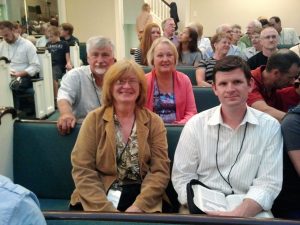 Romans 12:3
Romans 12:3
For by the grace given to me, I tell everyone among you not to think of himself more highly than he should think. Instead, think sensibly, as God has distributed a measure of faith to each one (HCSB).
“God uses purposeful community to transform our hearts. The gospel, in the context of a community trying to do something, challenges our hearts and lives. This happens because we are placed in a situation where we are called to repentance, faith, and obedience. This is the process many of us disregard when we isolate and live for ourselves” (Watson, Sent Together). An example of what we ought to do is found in a great chapter on the Christian way of life, Romans twelve.
In verses one and two of Romans twelve, the Spirit of God sets forth the transformed way of life that God desires for his dearly loved people. Next, the Spirit gives specific teaching about the way the transformed people act in local gatherings (12:3-8) and in love (12:9-21). The Spirit does this through Paul the apostle, who asserts his authority to speak for God by the phrase by the grace given to me. At the same time, this phrase provides a model for the way we are to act (cf. 12:6). God’s people have been made rich by grace, and we are to serve God and others in conformity with the grace given to us. This includes the times we correct each other, as Paul was led by the Spirit to correct the Roman Christians in this letter.
In this paragraph, there is instruction about the correct usage of spiritual gifts in local churches. It begins with the right attitude in each member of a gospel partnership. Yes, each member, because this instruction is addressed to everyone. Each one of us must have a correct evaluation of himself or herself. An easy trap to fall into is to assume that others have attitude problems and we do not. “He has a big head,” or “she is in love with herself”. That might be correct, but it turns our attention from the point of the text. You and I must seriously ask ourselves if we are thinking too highly of ourselves. Do we see that we have received mercy in many ways (12:1), or have we become infatuated with who we suppose we are?
At the same time, we must have a sensible or sober-minded assessment of who we are in Christ. Called by grace to be sons and daughters of God, we have received the Holy Spirit and spiritual gifts to follow Christ together. Therefore, we must not act less than we are. We can do what he has equipped us to do. Whether it is building up one another or reaching out to those away from the Lord, we should not be paralyzed by the not sensible opinion “I can’t to this!” God has placed you in life with the people around you for you to radiate the Father’s glory. In the same way, let your light shine before men, so that they may see your good works and give glory to your Father in heaven (Matthew 5:16 HCSB).
God has given each believer in Jesus a measure of faith. Faith is the gift of God (Ephesians 2:8-9; etc.), and so we can trust in the Lord for what we need to build up the body of Christ and to win people for the Lord. This weekend in your local church, you should seek to help others on their journey. Part of this might involve listening to someone you have not listened to previously. You might be able to encourage someone who is weak. Your prayer might stir someone’s heart, and your kindness could refresh another’s heart. Look at others with the eyes of God’s love, and then act in love. Do not hold yourself back. Love one another.
Grace and peace, David

 Psalm 25:1-3
Psalm 25:1-3

 2 Thessalonians 1:3-4
2 Thessalonians 1:3-4